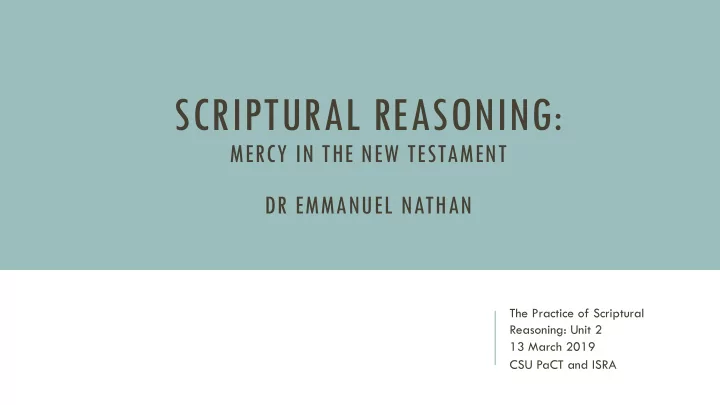

SCRIPTURAL REASONING: MERCY IN THE NEW TESTAMENT DR EMMANUEL NATHAN The Practice of Scriptural Reasoning: Unit 2 13 March 2019 CSU PaCT and ISRA
“WHO IS MY NEIGHBOUR?” Luke 10 25 Just then a lawyer stood up to test Jesus. “Teacher,” he said, “what must I do to inherit eternal life?” 26 He said to him, “What is written in the law? What do you read there?” 27 He answered, “You shall love the Lord your God with all your heart, and with all your soul, and with all your strength, and with all your mind; and your neighbor as yourself .” 28 And he said to him, “You have given the right answer; do this, and you will live.” 29 But wanting to justify himself, he asked Jesus, “And who is my neighbour ?” [Leviticus 19 17 You shall not hate in your heart anyone of your kin; you shall reprove your neighbor, or you will incur guilt yourself. 18 You shall not take vengeance or bear a grudge against any of your people, but you shall love your neighbour as yourself : I am the L ORD .]
“GO AND DO LIKEWISE” 30 Jesus replied, “A man was going down from Jerusalem to Jericho, and fell into the hands of robbers, who stripped him, beat him, and went away, leaving him half dead. 31 Now by chance a priest was going down that road; and when he saw him, he passed by on the other side. 32 So likewise a Levite, when he came to the place and saw him, passed by on the other side. 33 But a Samaritan while traveling came near him; and when he saw him, he was moved with pity. 34 He went to him and bandaged his wounds, having poured oil and wine on them. Then he put him on his own animal, brought him to an inn, and took care of him. 35 The next day he took out two denarii, gave them to the innkeeper, and said, ‘Take care of him; and when I come back, I will repay you whatever more you spend.’ 36 Which of these three, do you think, was a neighbour to the man who fell into the hands of the robbers?” 37 He said, “ The one who showed him mercy .” Jesus said to him, “Go and do likewise.”
ἔλεος Compassion eleos Noun, accusative, neuter, singular Strong's Concordance eleos: mercy, pity, compassion Original Word: ἔλεος, ους, τό Part of Speech: Noun, Masculine; Noun, Neuter Transliteration: eleos Phonetic Spelling: (el'-eh-os) Definition: mercy, pity, compassion Usage: pity, mercy, compassion.
“MOVED WITH PITY” (NRSV) Mark 1 40 A leper came to him begging him, and kneeling he said to him, “If you choose, you can make me clean.” 41 Moved with pity, Jesus stretched out his hand and touched him, and said to him, “I do choose. Be made clean!” 42 Immediately the leprosy left him, and he was made clean. 43 After sternly warning him he sent him away at once, 44 saying to him, “See that you say nothing to anyone; but go, show yourself to the priest, and offer for your cleansing what Moses commanded, as a testimony to them.” 45 But he went out and began to proclaim it freely, and to spread the word, so that Jesus could no longer go into a town openly, but stayed out in the country; and people came to him from every quarter.
“MOVED WITH ANGER” (NIV) Mark 1 40 A leper came to him begging him, and kneeling he said to him, “If you choose, you can make me clean.” 41 Moved with anger, Jesus stretched out his hand and touched him, and said to him, “I do choose. Be made clean!” 42 Immediately the leprosy left him, and he was made clean. 43 After sternly warning him he sent him away at once, 44 saying to him, “See that you say nothing to anyone; but go, show yourself to the priest, and offer for your cleansing what Moses commanded, as a testimony to them.” 45 But he went out and began to proclaim it freely, and to spread the word, so that Jesus could no longer go into a town openly, but stayed out in the country; and people came to him from every quarter.
σπλαγχνισθεὶς having been moved with compassion, splanchnistheis Verb, aorist participle passive, nominative masculine singular Strong's Concordance splagchnizomai: to be moved in the inward parts, i.e. to feel compassion Original Word: σπλαγχνίζομαι Part of Speech: Verb Transliteration: splagchnizomai Phonetic Spelling: (splangkh-nid'-zom-ahee) Definition: to be moved in the inward parts, to feel compassion Usage: I feel compassion, have pity on, am moved.
It is difficult to come to a firm decision concerning the original text. On the one hand, it is easy to see why ὀ ργισθε ί ς (“being angry”) would have prompted over-scrupulous copyists to alter it to σ π λαγχνισθε ί ς (“being filled with compassion”), but not easy to account for the opposite change. On the other hand, a majority of the Committee was impressed by the following considerations: (1) The character of the external evidence in support of ὀ ργισθε ί ς is less impressive than the diversity and character of evidence that supports σ π λαγχνισθε ί ς ; (2) At least two other passages in Mark, which represent Jesus as angry (3:5) or indignant (10:14), have not prompted over-scrupulous copyists to make corrections; (3) It is possible that the reading ὀ ργισθε ί ς either (a) was suggested by ἐ μβριμησ ά μενος of ver. 43, or (b) arose from confusion between similar words in Aramaic (compare Syriac ethra ḥ am, “he had pity,” with ethra’em, “he was enraged.” )
Recommend
More recommend